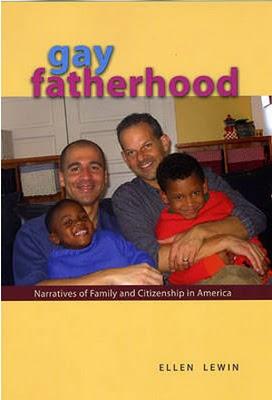Gay Fatherhood: Narratives of Family and Citizenship in America

In this well-written ethnography, Gay Fatherhood, Ellen Lewin examines the choices and the decisions of gay fathers in America, focusing particularly on men who choose to become fathers as gay men, rather than coming out after having had children in a different-sex marriage. Lewin, also the author of the 1993 ethnography Lesbian Mothers, works centrally from Chicago but has found research participants of impressive diversity with respect to race, religion, socioeconomic background, profession, number of children, and relationship to community. All of these elements make for a fascinating read.
The central question in Lewin’s book is one that has become increasingly pertinent and visible, particularly in queer communities, as the gay marriage debate advances in the United States. Does “being gay” simply mean being a man who loves and is sexually attracted to men, or does it imply another separateness, an inherent incompatibility, with a world that is and will always be predominantly straight? And does asserting the latter negate the identity of gay fathers, assuming "father," even "parent," to be the province of the straight world alone? Or does a gay man who chooses to be a father give up his right to identify as "gay?" Or does "parent" come to overshadow, to render irrelevant, the identity “gay”? And if none of the above are true, are there factors beyond the sexual orientation and gender of the parents that would specifically identify a family as a "gay family?"
As is often the case in anthropological research, Lewin explores these questions without ever fully answering them. Given the scope and depth of Lewin’s writing, however, no answer seems to be demanded. By simply displaying the complexity of the lives and relationships of gay fathers—relationships with partners, relationships with children, relationships with other parents, extended families, communities of friends, religious communities, communities of residence—she demonstrates that this is not an issue to be bullet-pointed or oversimplified. Lewin uses her ethnography to delve into the lives of gay families, and to show the complex nexus of identity at which they reside, and at which they must, in contemporary America, continue to reside. A true writer and a true anthropologist, she leaves the prescription of actions to her readers; there is no doubt that engagement with her writing will lead to more considered, and therefore better, action.